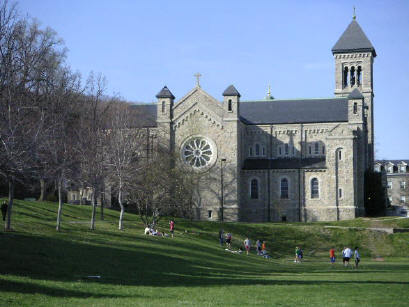For those of you who were not able to be in Emmitsburg on Saturday, you missed a wonderful day. The rain stopped sometime in the night and the early morning sun burned away the low clouds. Well before 9am, people began to arrive at the Knott Auditorium at Mount St. Mary’s University. Soon, the trickle became a much more. When we began planning this conference, we really had no idea if anyone would show up. We told ourselves that 60 or 70 people would count as a success. By the morning of the conference, 151 had pre-registered, and a good number registered at the door bringing out attendance to nearly 200.
Needless to say, we were delighted and encouraged by such a turnout. Emmitsburg is not exactly on the beaten path, so it required some effort to attend. People traveled from as far away as Ohio, Vermont, and New York. Some drove in on Friday and stayed in a hotel. Others got up in the middle of the night to arrive at Mount St. Mary’s for our 9am start.
It was great to meet reader and others interested in human scale and healthy communities. It was especially gratifying to meet folks who up to now have been know by their names or nicknames in the comment boxes. Indeed, nothing substitutes for face-to-face reality.
The panels dealt with various cultural, economic, and political elements needed to build healthy communities as well as various impediments to achieving that goal. The audience was treated to talks on how liberal assumptions and technological innovations serve to keep us endlessly on the move. Another panel included a discussion of the economics of localism as well as a PowerPoint presentation by Jason Peters (aka The Bar Jester) describing how he has helped incorporate training in the “domestic arts” into a college curriculum. In the afternoon, panelists discussed the role of religion in creating strong communities and how a liberal education can attend to matters of place. And finally, speakers showed how strong communities can be fostered by state governments, farmer’s markets, and by implementing the principles of the new urbanism. Our lunch speaker, Bill Kauffman, gave a stirring tribute to the goodness, decency, and, attractiveness of his particular place and encouraged us all to look for the same in ours.
Early on, when FPR was still in the planning stages, most of us thought of our little enterprise as a bit quixotic, definitely more fringe than mainstream. Events in recent months have conspired to put questions of human scale at center stage. Too big to fail is simply too big. The enthusiasm for globalization has been dampened by systems too big and complex for anyone to understand much less manage with intelligence. It is becoming clear that a return to human scaled enterprises and institutions is the only way to extricate ourselves from some of our most acute problems.
In short, and with all due modesty, it appears that current events are showing that the ideas that brought FPR together–political decentralism, economic localism, and cultural regionalism–are the future. We thank all who helped make Saturday’s conference such a success. We are already at work on the next event as well as other projects by which the ideas of FPR can be advanced. While difficult times may be ahead, the future of human scale communities looks bright.
Recordings of the conference will be available shortly.






16 comments
M. T. Gleeson
@D.W. Sabin
I’ll say! A long time reader from Australia, I couldn’t realistically consider attendance this time around. Recordings or transcripts would be helpful.
D.W. Sabin
So, eh…..where are the recordings?
Rob
I extend an invitation hold your next event in Madison, Wisconsin. I shouldn’t have to drive to a conference on localism, right?
dave walsh
Indeed a pleasure. Thanks. You speak the mind of more than you know.
Cliff Smith
One of the main points of the conference that I, at least, walked away with is that a healthy community needs above all else “a people deeply rooted in place”.
Patrick Deneen, who was the first to talk, tells us that the average person will move about 11 times in their lifetime. Any person who reads this, I am sure can think of reasons that are sound for one having to move as we all feel the pain of our global world. For Mr. Deneen, at least in his talk, puts the blame at the feet of our consumer economic system . And Mr. Deneen blames this system for people being mobile. He is correct. The gist of his talk, if I am correct, is that in our consumer economy you expand a persons freedom through unlimited choice but through unlimited choice you also create disloyalty. Disloyalty does not remain only in a man’s economic choices,but becomes a part of all his life choices. Thus people move 11 times in life because they are disloyal to the things that they should be most loyal too like place. My thought is that our consumer economy creates one loyalty only and that is to choice itself with in this economic system. In america we are convinced that unlimited choice of a product and freedom are the same thing. A man is free or less free in relation to how much choice he has in any given economic circumstance. It is true that freedom and choice go together but it is false to think that by expanding choice you expand freedom. Freedom does not have a number value other than one. It is correct to say “a man is free if and only if he has a choice”.
On to David Cloutier’s talk on ” The Luxury of Buying Local “. What he said is that luxury is not just in the quality or price of a thing but also, in how many choices one has in buying that thing . He is stating that unlimited choice in a product is itself a type of luxury in our economy. The Common Market is used as an example of a place to shop local that he says may not have all the choices of the big stores but does supply enough choices to supply for one’s needs. I think that many at the conference would agree with this statement “that just because a man has less choice does not mean he has less freedom with which to live the good life”.
Walt
Thank you for making these presentations available for those who couldn’t attend the meeting. If you all ever hold a gathering in Louisiana (or somewhere nearby), I would do my best to be there.
On a related note, do you at FPR have any plans to post some kind of ‘Essential Reading’ list of books and/or essays, etc. that lay out the foundational principles of localism, small-scale living, agrarianism, and so forth?
Seth
Might I suggest an Indiana-based conference? It seemed many presenters and attendees had Hoosier roots and connections, and it could coincide with the Spring ISI conference . . .
We could even wave to Dr. Berry from across the Ohio.
Bart
One does wonder, however, with Mr. Peters fascination with accusing Mr. Mitchell of watching Lady Gaga. A ploy to cover up his moonlighting duties as a Gaga backup dancer?
C R Wiley
Wish I could have been there. Any plans for a localized approach — taking it on the road so to speak — perhaps multiple sites making is easier for locals to attend? (Or local host groups inviting you to bring the show to them?) I know this all seems counter to the spirit of the event, just wondering if this may be more paradoxical than contradictory.
Mark T. Mitchell
@C R Wiley: Yes, we are contemplating doing just that. Stay tuned.
Rob G
The conference was, in the parlance of the day, the bomb. Let’s hope there are many more. As Mark says, it was great to meet all the folks known previously by name only. And it was equally great to see so many young people, which would indicate that the “movement” has a future.
“it was clear he couldn’t operate the damned system without detailed instructions that would have insulted a child.”
A flask of Knob Creek, concealed conveniently behind the lectern, would go a long way towards solving this problem in future. And if it didn’t help, at very least it would provide an excuse.
Bart
Cheers and thanks to all of you. My recommendation for the next one? More farmers!
Marion Miner
Very sorry that I was not able to attend; I’m counting on another conference next year.
Jason Peters
And Peters is still trying to write the punchline. (Thanks a lot, Mitchell!)
Either the PP was part of an elaborate joke in which irony was a main objective, or Peters, merely meaning to show a few slides in recompense for Deneen’s chloroformic performance, knew not what he implicated himself in.
At any rate, about 200 people can attest to the fact that, as Peters arose to cure a room full of insomniacs (a corporal office at which he excels), it was clear he couldn’t operate the damned system without detailed instructions that would have insulted a child.
Jeffrey Polet
I love it when ignorance and incompetence pass themselves off as virtues. I bet you watch “The Price is Right” on your 52″ plasma every day as well.
Stephen
Jason Peters used a PowerPoint presentation? I’m waiting for the punch line.
Comments are closed.